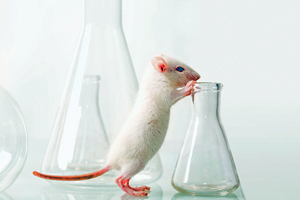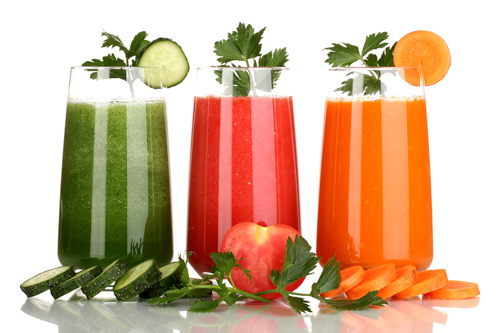Water fasting and juice fasting, like detoxing–and heck, if done correctly, they are forms of detoxing–are the Rodney Dangerfield of alternative health: they “don’t get no respect.”1 http://www.youtube.com/watch?v=ZCVR_ajL_Eo According to WebMD, for example, there isn’t enough evidence to support health claims for either water fasting or juice fasting, and “that type of fasting can actually be dangerous, especially for people who have other medical problems.”2 “Fasting – Topic Overview.” WebMD. 11 July 2011. (Accessed 1 Mar 2013.) http://www.webmd.com/diet/tc/fasting-topic-overview And according to an NBC News article that cites a number of so-called experts, long-term fasts can lead to muscle breakdown and a shortage of many needed nutrients, in addition to depriving the body of the vitamins and minerals that you get from food, which can “actually weaken the body’s ability to fight infections and inflammation.”3 Susan Moores. “Experts warn of detox diet dangers.” NBCNews.com. 18 May 2007. (1 Mar 2013.) http://www.nbcnews.com/id/18595886/ The article goes on to state that because crash diets–their euphemism for either water fasting or juice fasting– can upset blood sugar, potassium and sodium levels in the body, people with diabetes, heart or kidney disease or women who are pregnant or nursing shouldn’t try them; and children, teens, older adults, or people with certain digestive conditions should also steer clear.
More recently, juice fasting in particular has taken a beating. For example, an October article in The Washington Post cites Nazrat Mirza, pediatrician and co-director of the Obesity Institute at Children’s National Medical Center, who states, “Most parents give their kids fruit juice because of the perception that it’s healthy. I don’t know where that perception came from.”4 Gabriella Boston. “Fruit juice has benefits, but calories outweigh them, experts say.” Washington Post. 1 October 16, 2012. (Accessed 1 March 2013.) http://articles.washingtonpost.com/2012-10-16/lifestyle/35500116_1_fruit-juice-juice-products-association-calories Mirza goes on to state that while it’s true that many juices — particularly orange juice — are fortified with calcium and have a healthful amount of Vitamin C, you are getting those vitamins at a high calorie cost.” (By the way, note that if she’s talking about “fortified” juices, she’s not talking fresh juices.)
And a website called “Hooked on Juice” (yes, it really is named that) takes on all forms of juice fasting with the statement, “Even with no sugar added, fruit juice has the same amount of sugar as soda. Why? Because fruit is full of sugar!”
Water Fasting VS Juice Fasting VS Juice Fasting Plus Single Cell Protein, Part 1
Water fasting, juice fasting, and juice fasting supplemented with single cell proteins are not the same thing. They are closely related, but they are different. Although they share “some” of the same benefits, you use them for different purposes and in different ways. Unfortunately, most people are not aware of these differences and use the different forms incorrectly, at the wrong times, and in the wrong way. This leads to problems–and allows the medical community to pounce on the problems this creates and thus brand all fasting as ineffective, unnecessary, and generally harmful. We will return to this topic a little later when we explore those differences…and benefits.
But for now, despite what you have been led to believe, there are still elements of fasting–notably water fasting–that have been studied by the scientific community with consistently positive results.
 Benefits of Fasting as Demonstrated in Studies
Benefits of Fasting as Demonstrated in Studies
Curiously, the medical community chooses to say that these studies are not conclusive, thereby rendering all benefits of fasting moot. It’s a marvelous inconsistency, of course, considering that the medical community has decided to forego similar rigor when it comes to the issue of off-label pharmaceutical prescriptions. Off-label drugs, freely prescribed by doctors, are often accompanied by a complete–zilch, nada, zero–lack of clinical evidence supporting the efficacy or safety of that off-label application. Perhaps the doctors are relying on Ralph Waldo Emerson’s statement from his essay on Self-Reliance, “A foolish consistency is the hobgoblin of little minds,” to justify what otherwise might be viewed as hypocrisy.
In any case, there is a great deal of scientific support for the virtues of fasting. Here are a handful of such studies.
Heart disease, Cholesterol, Diabetes, and HGH
In 2011, research cardiologists at the Intermountain Medical Center Heart Institute reported that fasting not only lowers one’s risk of coronary artery disease and diabetes, but also produces significant beneficial changes in a person’s blood cholesterol levels.5 “Study finds routine periodic fasting is good for your health, and your heart.” Intermountain Medical Center. 3 April 11. (Accessed 3 Mar 2012.) http://www.eurekalert.org/pub_releases/2011-04/imc-sfr033111.php According to the researchers, “Fasting causes hunger or stress. In response, the body releases more cholesterol, allowing it to utilize fat as a source of fuel, instead of glucose. This decreases the number of fat cells in the body. This is important because the fewer fat cells a body has, the less likely it will experience insulin resistance, or diabetes.” In addition, the study effectively confirmed earlier findings about the effects of fasting on human growth hormone (HGH). HGH works to protect lean muscle and metabolic balance, a response triggered and accelerated by fasting. During 24-hour fasting periods, HGH increased an average of 1,300 percent in women, and nearly 2,000 percent in men. And yet another study found that simply disrupting normal eating cycles through intermittent fasting improved the ability of the body to process, sense, and recognize the nutrients it was consuming, thereby helping to prevent obesity, diabetes, and liver diseases in mice on a high-fat diet.6 Megumi Hatori, Christopher Vollmers, Amir Zarrinpar, et al. “Time-Restricted Feeding without Reducing Caloric Intake Prevents Metabolic Diseases in Mice Fed a High-Fat Diet. 6 June 2012. Cell Metabolism 15(6) pp. 848 – 860. http://www.sciencedirect.com/science/article/pii/S1550413112001891 In addition, intermittent fasting raised bile acid production, which is essential for properly digesting fats, and energy expenditure and reduced inflammation.
Brain aging
A 2006 study found that both caloric restriction (CR) and intermittent fasting (IF) can prolong the health-span of the nervous system by affecting fundamental metabolic and cellular signaling pathways that regulate life-span.7 Bronwen Martin, Mark P. Mattson, Stuart Maudsleya. “Caloric restriction and intermittent fasting: Two potential diets for successful brain aging.” Ageing Res Rev. 2006 August; 5(3): 332–353. http://www.ncbi.nlm.nih.gov/pmc/articles/PMC2622429 CR and IF affect energy, free radical production, and cellular stress response systems in ways that protect neurons against genetic and environmental factors to which they would otherwise succumb during aging. Specifically, the researchers found that both IF and CR induce a mild stress response in brain cells, which results in the activation of compensating mechanisms. According to the researchers, IF regimens have previously been demonstrated to lessen and even stop damage to neurons and improve outcomes in animal models of both neurological trauma such as stroke8 Yu ZF, Mattson MP. “Dietary restriction and 2-deoxyglucose administration reduce focal ischemic brain damage and improve behavioral outcome: evidence for a preconditioning mechanism.” J. Neurosci. Res. 1999;57:830–839 http://www.ncbi.nlm.nih.gov/pubmed/15247064 and also age-related neurodegenerative disorders such as Parkinson’s disease9 Duan W, Mattson MP. “Dietary restriction and 2-deoxyglucose administration improve behavioral outcome and reduce degeneration of dopaminergic neurons in models of Parkinson’s disease.” J. Neurosci. Res. 1999;57:195–206. http://www.ncbi.nlm.nih.gov/pubmed/9354418 and Huntington’s disease.10 Duan W, Guo Z, Jiang H, Ware M, Li XJ, Mattson MP. “Dietary restriction normalizes glucose metabolism and BDNF levels, slows disease progression, and increases survival in huntingtin mutant mice.” Proc. Natl. Acad. Sci. U.S.A. 2003;100:2911–2916. http://www.ncbi.nlm.nih.gov/pmc/articles/PMC151440
Cancer
 Building on previous work that had found that fasting for as little as two days protects healthy cells against chemotherapy,11 Lizzia Raffaghello, Changhan Lee, Fernando M. Safdie, et al. “Starvation-dependent differential stress resistance protects normal but not cancer cells against high-dose chemotherapy.” PNAS June 17, 2008 vol. 105 no. 24. http://www.pnas.org/content/105/24/8215.full a new study published just this month found that fasting may actually retard tumors, while at the same time protecting against the harmful side effects of chemotherapy.12 Lee C, Raffaghello L, Brandhorst S, Safdie FM, et al. “Fasting cycles retard growth of tumors and sensitize a range of cancer cell types to chemotherapy.” Sci Transl Med. 2012 Mar 7;4(124):124ra27. http://www.ncbi.nlm.nih.gov/pubmed/22323820 As mentioned, the cell-protective effects of starvation had previously been demonstrated in a 2012 study. Researchers found that mice given a high dose of chemotherapy after fasting continued to thrive, while half of the normally fed mice died and half experienced lasting weight loss. Importantly, the chemotherapy extended the life span of mice injected with cells from an aggressive human tumor, and the animals later gained back the weight they had lost due to food deprivation. In addition, laboratory studies of normal human brain cells and cancerous brain cell lines that underwent a short period of starvation (low glucose) revealed that normal cells also became resistant to chemotherapy (a good thing), while cancerous brain cell lines remained susceptible. In fact, the 2012 study found that five out of eight cancer types in mice responded to fasting alone. Just as with chemotherapy, fasting slowed the growth and spread of tumors. And without exception, “the combination of fasting cycles plus chemotherapy was either more or “much more” effective than chemo alone.
Building on previous work that had found that fasting for as little as two days protects healthy cells against chemotherapy,11 Lizzia Raffaghello, Changhan Lee, Fernando M. Safdie, et al. “Starvation-dependent differential stress resistance protects normal but not cancer cells against high-dose chemotherapy.” PNAS June 17, 2008 vol. 105 no. 24. http://www.pnas.org/content/105/24/8215.full a new study published just this month found that fasting may actually retard tumors, while at the same time protecting against the harmful side effects of chemotherapy.12 Lee C, Raffaghello L, Brandhorst S, Safdie FM, et al. “Fasting cycles retard growth of tumors and sensitize a range of cancer cell types to chemotherapy.” Sci Transl Med. 2012 Mar 7;4(124):124ra27. http://www.ncbi.nlm.nih.gov/pubmed/22323820 As mentioned, the cell-protective effects of starvation had previously been demonstrated in a 2012 study. Researchers found that mice given a high dose of chemotherapy after fasting continued to thrive, while half of the normally fed mice died and half experienced lasting weight loss. Importantly, the chemotherapy extended the life span of mice injected with cells from an aggressive human tumor, and the animals later gained back the weight they had lost due to food deprivation. In addition, laboratory studies of normal human brain cells and cancerous brain cell lines that underwent a short period of starvation (low glucose) revealed that normal cells also became resistant to chemotherapy (a good thing), while cancerous brain cell lines remained susceptible. In fact, the 2012 study found that five out of eight cancer types in mice responded to fasting alone. Just as with chemotherapy, fasting slowed the growth and spread of tumors. And without exception, “the combination of fasting cycles plus chemotherapy was either more or “much more” effective than chemo alone.
The new study, published just a few days ago, on the other hand, actually found that cycles of starvation were as effective as chemotherapy drugs in delaying the progression of different tumors and increased the effectiveness of these drugs against melanoma, glioma, and breast cancer cells. In mouse models of neuroblastoma, fasting cycles plus chemotherapy drugs–but not either treatment alone–resulted in long-term cancer-free survival. According to the researchers, these studies suggest that multiple cycles of fasting promote differential stress sensitization in a wide range of tumors and could potentially replace or augment the efficacy of certain chemotherapy drugs in the treatment of various cancers.
That’s not insignificant.
Diabetes and Brain Damage
And finally, it has been known for many years that calorie restricted diets have been shown to have several health benefits including increased insulin sensitivity, stress resistance, reduced morbidity, and increased life span. The mechanism still remains unknown, but the need for a long-term reduction in caloric intake to achieve these benefits has always been assumed, at least until a 2002 study found that intermittent fasting by itself resulted in beneficial effects that met or exceeded those of caloric restriction. We’re talking about benefits including reduced serum glucose and insulin levels and increased resistance of neurons in the brain to excitotoxic stress.13 R. Michael Anson, Zhihong Guo, Mark P. Mattson, et al. “Intermittent fasting dissociates beneficial effects of dietary restriction on glucose metabolism and neuronal resistance to injury from calorie intake.” PNAS 2003 100 (10) 6216-6220. http://www.pnas.org/content/100/10/6216.full.pdf+html?sid=b96bbfde-06cd-4192-8480-23a7792e907c In other words, intermittent fasting produces the same kinds of beneficial effects on glucose regulation in diabetics and neuronal resistance to injury as caloric restriction…but most likely exceeds them.
Water Fasting VS Juice Fasting VS Juice Fasting Plus Single Cell Protein, Part 2
Water fasting is certainly more extreme than juice fasting or juice fasting plus spirulina or chlorella, but is the extremity worth it? That depends on what you’re after. As you will see in the chart below, water fasting provides some benefits that juice fasting does not–but they come at a cost. Let’s take a look:
|
Water |
Juice |
Juice/plus |
|
|
Ketosis |
Yes |
No |
No |
|
Autolysis |
Yes |
Moderate |
Mild |
|
Cleansing toxins |
Yes |
Yes |
Yes |
|
Cleansing reaction |
Yes |
Moderate |
Mild |
|
Resting the organs of the digestive system |
Yes |
Yes |
Yes |
|
Losing weight |
So So |
So So |
Yes |
|
Electrolyte imbalance |
Yes |
No |
No |
|
Glucose imbalance |
Yes |
So So |
No |
|
Fatigue |
Yes |
So So |
No |
|
Loss of muscle mass |
Yes |
Yes |
Moderate |
|
Alkaline pH |
No |
Yes |
Yes |
Ketosis
Normally your body burns carbohydrates for fuel. Ultimately, carbs are the main source of fuel for your brain, heart, and most other organs. During a water fast, after your body has used up all the available carbohydrate calories from your last meal, it then turns to the glycogen stored in your liver to meet its energy needs. Once your glycogen stores are used up, your body finally turns to its fat reserves. At this point, your body is in a state of ketosis. A person in ketosis is getting energy from ketones, little carbon fragments that are the fuel created by the breakdown of fat stores. Mild ketosis, at least short term, can be beneficial. The first benefit is that it accelerates the loss of fat in your body; the second is that it can actually help stabilize your body’s glycemic response over time.14Eric C Westman1, William S Yancy, John C Mavropoulos, et al. “The Effect of a Low-Carbohydrate, Ketogenic Diet Versus a Low-Glycemic Index on Glycemic Control in Type 2 Diabetes Mellitus” Nutrition & Metabolism 2008, 5:36. http://www.nutritionandmetabolism.com/content/pdf/1743-7075-5-36.pdf And thirdly, it can actually reduce hunger. When the body is in ketosis, you tend to feel less hungry.
But longer term, or at more extreme levels, ketosis is definitely more bad than good. High levels of ketones can cause gout, kidney stones, and even lead to organ failure–particularly kidney failure. Note: as little as 100 grams of carbohydrates a day (not counting fiber) can prevent ketosis in your body.
Autolysis
The technical definition of autolysis is the destruction of the tissues or cells of an organism by substances that are produced within that organism. When it comes to fasting, we can think of this as the body digesting parts of itself to compensate for insufficient calories being consumed. The breaking down of fat cells through ketosis is one example. The breaking down of muscle and organ tissue to extract protein for more immediate needs is another. If we believe the process to be random and arbitrary, as the medical community supposes, then it should be avoided at all costs. But as any endurance athlete can tell you, your body does not break down arbitrarily under autolytic conditions. As it turns out, you body is fundamentally self-aware and intelligent; it “digests” diseased and weakened tissue before healthy tissue. For an endurance runner, that means her body will “use up” her upper body tissue before it even thinks of taking anything from her legs. Quite simply, your body has the ability to readily adjust to changing circumstances–breaking down tissue in one part of the body and reassembling it in another, again as circumstances require.
Years ago, I hiked the full 212 mile length of the John Muir Trail and lost 13 lbs during the trip. At altitude and carrying a 70 lb pack, I was burning better than 5,000 calories a day and couldn’t come close to eating that much. At the end of the hike, you could count my ribs, but I had legs like a billy goat. My body digested the tissue it didn’t need for the task at hand, but built it even stronger where necessary. Autolysis is not arbitrary. During fasting, autolysis is self-aware.
Since you are consuming fewer calories in a water fast, autolysis is more pronounced than with a juice fast. This means that your body will be breaking down unneeded, damaged, and toxic tissue faster than with other forms of fasting. However, as long as you are not overdoing the calories while juice fasting, autolysis will still take place while on a juice fast — just not as pronounced.
Cleansing Toxins and Cleansing Reaction

Different health experts have different opinions on this, but I believe that the main purpose of fasting is intelligent autolysis, with the removal of toxins from the body an important but secondary benefit. And when it comes to intelligent autolysis, water fasting is indeed stronger. But being stronger isn’t necessarily better. Juice fasting provides benefits that water fasting does not. The breakdown of tissue as a result of autolysis during fasting both creates and releases toxins into the bloodstream. The body’s response to these toxins is to first oxidize them, then reduce them, and finally conjugate them (i.e., combine them with something else) to create a less toxic or inactive compound and safely escort those compounds out of the body. Most of this is accomplished in the liver, but—and here’s the key point—the process requires nutritional cofactors to conjugate the toxins. When juice fasting, these cofactors are abundantly provided by the fresh juice. When water fasting, no such luck. Elimination of these toxins when water fasting is, therefore, much more uncomfortable.
And it is here that fasting with juices plus single cell proteins such as chlorella and/or spirulina stands out. Both chlorella and spirulina are chelating and purifying agents that bond with the toxins and usher them out of your body. It’s not a coincidence that algae such as chlorella are used in water treatment plants to remove toxins from drinking water.
Resting the Organs of the Digestive System
All three forms of fasting are useful when it comes to resting the digestive system since they require no, or very little, work from the digestive system in terms of processing. Note: this is why protein supplementation for the juice has to be of the single cell variety–to minimize any effort made by your digestive system. Spirulina is so easy to digest because it is surrounded by a thin membrane of complex sugars which dissolve easily in the stomach. Chlorella, on the other hand, is easy to digest since virtually all varieties sold as food are “broken-celled,” meaning that the cell wall has already been breached and requires no further digestion to access the nutrients inside.
Note: while fasting, you are not only resting the organs of digestion from their workload, you are also freeing up the energy in your body normally devoted to digestion. Most people think that food provides them with energy, and it does…long term. But short term, digestion is an energy intensive process. Just consider for a moment how exhausted you feel after eating a large meal. While fasting, you free up that energy that was previously employed in digestion for the purposes of rebuilding and repairing other tissues in the body. In his book, The Science and Fine Art of Fasting, Herbert Shelton calls this “physiological compensation.15 Herbert M. Shelton. “The Science and Fine Art of Fasting.” Natural Hygiene Press; 5th edition (August 1978) ” As he says, “Energy saved in one department may be expended in another.”
Electrolyte and Glucose Imbalance and Fatigue
Water fasting is the most likely form of fasting to cause problems in terms of electrolyte and glucose imbalances, as well as fatigue. Since you’re not taking in any electrolytes or glucose, you are going to run short. If you’re healthy and the fast is short term, that’s not a problem. But if you’re not healthy, or the fast goes on longer than three days, the problems and risks increase. Water fasts longer than three days can cause irregular heartbeats (especially if your potassium levels have dropped) and extreme swings of fatigue from the drop in glucose levels. And in some cases, where the faster doesn’t know what they’re doing, water fasting even presents a risk of death from the lack of electrolytes. It’s the reason, if you’re new to fasting, I never recommend a pure water fast longer than three days unless someone knowledgeable is personally guiding you through the process. Experienced fasters who are in tune with their bodies, on the other hand, can navigate longer periods of water fasting safely. Juice fasting is much less problematic for newbies in this regard.
Interestingly, juice fasting can present an opposite problem. If you rely too much on sweet fruit juices for your fast, you can push glucose levels up much too high, which can lead to severe glycemic swings. It’s the reason that I recommend juicing primarily with vegetable juices while fasting and diluting any fruit juices you drink with pure water. The sweeter the juice, the more you’ll want to dilute it–two or three parts water to one part juice is not unwarranted for such juices.
By the way, this is why the Master Cleanse adds both lemon juice and maple syrup to its version of the water fast — lemon for the electrolytes and maple syrup to prevent glucose dips.
Loss of Muscle Mass
This is pretty automatic: unless you are consuming protein, you will lose overall muscle mass. Yes, you can build muscle in particular areas even while fasting, but you accomplish that by cannibalizing protein from other muscle tissue that is not being stressed. As I mentioned earlier, when I hiked the John Muir Trail, I built muscle in my legs, but only by cannibalizing muscle from my upper body. And this is where consuming single-cell proteins while fasting truly shines. Because they are such highly concentrated proteins, and so easily digested, supplementing with them while fasting minimizes the muscle loss and ensures that the majority of weight lost is water and fat…while at the same time giving you the benefits of fasting.
Alkaline pH
Ketones are both acidic and acid forming in the body; thus, pushing your body into ketosis while water fasting can be acidifying to the body. However, drinking enough water will flush the ketones quickly from the body, thereby minimizing that effect. Nevertheless, there is nothing in a pure water fast to help promote alkalinity. Incidentally, that’s one of the reasons the Master Cleanse fast includes lemon juice with the water. As I’ve explained in other newsletters, although citrus fruits are acidic, they actually promote alkalinity in the body. Another possibility is to water fast using a water ionizer, which will help promote alkalinity in the body. Be careful, though, not to set the alkalinity too high; otherwise, since you’ll be drinking so much water during the fast, you can promote a state of too much alkalinity.
In any case, juice fasting–especially with vegetable juices–is helpful in promoting a proper alkaline state. And the single-celled algae are also alkalinizing.
Weight-loss
Water fasting is the least effective form of fasting for weight loss since with no calories your body quickly goes into shut down mode to prevent starvation. In other words, water fasting slows your metabolism so that you “survive” on fewer calories. This means that you progressively lose less weight as the fast goes on, but even more important, you have a high rebound effect once you start eating again…since your metabolism is now slower and it takes even fewer calories to put weight back on.
For that reason, juice fasting is better for losing weight and juice fasting with one-celled protein even better. They both offer less slowing of your metabolism–and, therefore, less rebound. That said, if you decide to use either water fasting or juice fasting for weight-loss, I recommend alternate day fasting. Eating every other day prevents the body from shutting down. Note: just make sure you don’t overeat on your alternate eating days in an unconscious attempt to “compensate” for what you didn’t eat the day before. Overindulging in calories on eating days pretty much nullifies the gains you make on fasting days.
Conclusion
Fasting is an essential component of the Baseline of Health Program for preventing and even reversing catastrophic illness. I personally have done all different kinds of fasting over the years–including longer water fasts, Master Cleanses, and juice fasts. In the end, after years of trial error, I’ve settled on the vegetable juice fast (with a small amount of fruit juice), supplemented with chlorella or spirulina, as the best form of fasting for the vast majority of people. And it’s the form of fasting I personally use most often. It’s effective; reasonably pleasant, as fasts go; has the smallest chance of a detox reaction; is the easiest for most people to do, and is far and away the safest form of fasting. That said, I recommend the following guidelines.
Type of Juice
In general, you want to use low sugar vegetable juices over high sugar fruit juices. Be sure and dilute any fruit juices that you do use. As I mentioned earlier, diluting two or three parts water for each part juice is advisable when drinking fruit juices.
 No bottled juices! They are essentially sugar water, or just plain dead. Get a juicer. My favorite juicers now are the Breville 800JEXL – Juice Fountain Elite Extractor for when I want something quick and easy to clean up after and the Tribest Green Star Green Power Gold when I am juicing throughout the day for more than a couple of days. The Green Power does a superior job but is more of a pain to use and clean. However, if you are juicing throughout the day, you only need to clean it at the end of the day. And for those who want only the very best, the Norwalk Model 280 is the crème de la crème of the juicing world. But at $2,500, it’s outrageously expensive and a real pain in the butt to use and clean. Most people will not have the patience to stick with it; but for those who do, it produces superior juice. Note: I love my VitaMix blender. I wouldn’t own anything else, but it’s a blender and not a juicer. It liquefies fruits and vegetables; it doesn’t juice them. It’s great for pure fruit and vegetable smoothies, but not for juice fasting.
No bottled juices! They are essentially sugar water, or just plain dead. Get a juicer. My favorite juicers now are the Breville 800JEXL – Juice Fountain Elite Extractor for when I want something quick and easy to clean up after and the Tribest Green Star Green Power Gold when I am juicing throughout the day for more than a couple of days. The Green Power does a superior job but is more of a pain to use and clean. However, if you are juicing throughout the day, you only need to clean it at the end of the day. And for those who want only the very best, the Norwalk Model 280 is the crème de la crème of the juicing world. But at $2,500, it’s outrageously expensive and a real pain in the butt to use and clean. Most people will not have the patience to stick with it; but for those who do, it produces superior juice. Note: I love my VitaMix blender. I wouldn’t own anything else, but it’s a blender and not a juicer. It liquefies fruits and vegetables; it doesn’t juice them. It’s great for pure fruit and vegetable smoothies, but not for juice fasting.
Chlorella, Spirulina, or Blue Green Algae
It’s six of one, half dozen of the other. My personal preference is for chlorella because I believe it does a better job as a detoxing agent. It’s certainly superior in its ability to chelate heavy metals. But spirulina and blue green algae offer a better protein source. Also, look out for allergies. People who are allergic to seafood may have a problem with one or the other of these foods. Note: blue green algae is likely to be the least problematic in this regard.
In any case, buy organic from a trusted manufacturer that grows their algae in a very clean environment. Don’t buy bargain brands that don’t state how they are grown.
Juicing schedule
As a basic schedule, I like the following:
- One day of juice fasting with chlorella a week. (I like Mondays because it cleans things up after the weekend and breaks the flow after any indulgences I may have allowed myself. And if I’m trying to lose any weight, I’ll do both Mondays and Fridays for a couple of weeks.)
- Once a month, I like to extend that one day juice fast three days. There’s an old saying in the world of fasting. One day gives your body a rest; three days is good for minor repair; and five to seven days works as a complete overhaul for your body.
- With that in mind, twice a year, I now do a five-day juice and chlorella fast in combination with my bi-annual kidney/liver/gallbladder/blood detox. I do one of those the first week in January to cleanse my body of all the bad stuff I ate over the holidays–and to break any bad eating habits I acquired during that period. I do the other one mid-summer, but am more flexible as to the exact dates.
Warnings
Diabetics need to exercise special care when fasting–even short-term. Diabetics should not start with water fasting as this can play havoc with your blood sugar levels. And absolutely, do not base your fast on undiluted fruit juices as this can send your blood sugar levels through the roof. Vegetable juices are preferable, and the use of supplemental single-celled proteins can smooth the edges out even further. In any case, work with your physician and monitor your blood sugar regularly. Also fasting is not recommended for women who are pregnant or breastfeeding as it can stir up toxins that can impact the child. And anyone who has a chronic illness, is using prescription medications, or is under a doctor’s care should check with their doctor or naturopathic physician before embarking on a fasting program.
Final Word
Despite what the medical community may feel about the practice, fasting is one of the cornerstones of many alternative health programs. As I have repeatedly stated over the years, a good juicer is one of the single best investments you can make in your health. And let me be absolutely clear, I do not sell juicers, and I do not make any money if you buy one. I just recommend their use.

References
| ↑1 | http://www.youtube.com/watch?v=ZCVR_ajL_Eo |
|---|---|
| ↑2 | “Fasting – Topic Overview.” WebMD. 11 July 2011. (Accessed 1 Mar 2013.) http://www.webmd.com/diet/tc/fasting-topic-overview |
| ↑3 | Susan Moores. “Experts warn of detox diet dangers.” NBCNews.com. 18 May 2007. (1 Mar 2013.) http://www.nbcnews.com/id/18595886/ |
| ↑4 | Gabriella Boston. “Fruit juice has benefits, but calories outweigh them, experts say.” Washington Post. 1 October 16, 2012. (Accessed 1 March 2013.) http://articles.washingtonpost.com/2012-10-16/lifestyle/35500116_1_fruit-juice-juice-products-association-calories |
| ↑5 | “Study finds routine periodic fasting is good for your health, and your heart.” Intermountain Medical Center. 3 April 11. (Accessed 3 Mar 2012.) http://www.eurekalert.org/pub_releases/2011-04/imc-sfr033111.php |
| ↑6 | Megumi Hatori, Christopher Vollmers, Amir Zarrinpar, et al. “Time-Restricted Feeding without Reducing Caloric Intake Prevents Metabolic Diseases in Mice Fed a High-Fat Diet. 6 June 2012. Cell Metabolism 15(6) pp. 848 – 860. http://www.sciencedirect.com/science/article/pii/S1550413112001891 |
| ↑7 | Bronwen Martin, Mark P. Mattson, Stuart Maudsleya. “Caloric restriction and intermittent fasting: Two potential diets for successful brain aging.” Ageing Res Rev. 2006 August; 5(3): 332–353. http://www.ncbi.nlm.nih.gov/pmc/articles/PMC2622429 |
| ↑8 | Yu ZF, Mattson MP. “Dietary restriction and 2-deoxyglucose administration reduce focal ischemic brain damage and improve behavioral outcome: evidence for a preconditioning mechanism.” J. Neurosci. Res. 1999;57:830–839 http://www.ncbi.nlm.nih.gov/pubmed/15247064 |
| ↑9 | Duan W, Mattson MP. “Dietary restriction and 2-deoxyglucose administration improve behavioral outcome and reduce degeneration of dopaminergic neurons in models of Parkinson’s disease.” J. Neurosci. Res. 1999;57:195–206. http://www.ncbi.nlm.nih.gov/pubmed/9354418 |
| ↑10 | Duan W, Guo Z, Jiang H, Ware M, Li XJ, Mattson MP. “Dietary restriction normalizes glucose metabolism and BDNF levels, slows disease progression, and increases survival in huntingtin mutant mice.” Proc. Natl. Acad. Sci. U.S.A. 2003;100:2911–2916. http://www.ncbi.nlm.nih.gov/pmc/articles/PMC151440 |
| ↑11 | Lizzia Raffaghello, Changhan Lee, Fernando M. Safdie, et al. “Starvation-dependent differential stress resistance protects normal but not cancer cells against high-dose chemotherapy.” PNAS June 17, 2008 vol. 105 no. 24. http://www.pnas.org/content/105/24/8215.full |
| ↑12 | Lee C, Raffaghello L, Brandhorst S, Safdie FM, et al. “Fasting cycles retard growth of tumors and sensitize a range of cancer cell types to chemotherapy.” Sci Transl Med. 2012 Mar 7;4(124):124ra27. http://www.ncbi.nlm.nih.gov/pubmed/22323820 |
| ↑13 | R. Michael Anson, Zhihong Guo, Mark P. Mattson, et al. “Intermittent fasting dissociates beneficial effects of dietary restriction on glucose metabolism and neuronal resistance to injury from calorie intake.” PNAS 2003 100 (10) 6216-6220. http://www.pnas.org/content/100/10/6216.full.pdf+html?sid=b96bbfde-06cd-4192-8480-23a7792e907c |
| ↑14 | Eric C Westman1, William S Yancy, John C Mavropoulos, et al. “The Effect of a Low-Carbohydrate, Ketogenic Diet Versus a Low-Glycemic Index on Glycemic Control in Type 2 Diabetes Mellitus” Nutrition & Metabolism 2008, 5:36. http://www.nutritionandmetabolism.com/content/pdf/1743-7075-5-36.pdf |
| ↑15 | Herbert M. Shelton. “The Science and Fine Art of Fasting.” Natural Hygiene Press; 5th edition (August 1978) |












What about the contamination
What about the contamination in spiruliba, chlorella, and algae?
Also, how do u circumvent the food cravings while on a fast?
What is ur method for breaking the fast appropriately?
Is this beneficial for someone with gut dysbiosis and if so how of a fast (and what type) should one do?
As the newsletter says: buy
As the newsletter says: buy organic from a trusted manufacturer that grows their algae in a very clean environment. Don’t buy bargain brands that don’t state how they are grown. Your question is specifically why Jon made wrote that.
Drink smaller amounts of juice and green protein at a time, but more often than three times a day. By consuming something every 3-4 hours, that will help control hunger pangs. As for cravings, it gets easier and easier the more you fast. Starting with one day a week helps you get a handle on your cravings. When ready, move up to a two day and then a three day fast. As Bill Murray said inWhat About Bob, “Baby steps.”
One day fasts are not a particular problem, but for breaking longer fasts, start with small salads and fresh fruit (organic if possible) to help push out anything left in the colon and to get the colon moving again. A colon corrective type formula can be helpful here. The next day you can incorporate some steamed vegetables. Over the next few days gradually shift back to your normal diet — hopefully with a little more discipline.
For dysbiosis check out http://www.jonbarron.org/article/q-jon-2004
What a great article! Precise
What a great article! Precise, to the point. Definitely putting a bookmark on this one!
And starting a one juice/ green algae fast. I’m eager to try to adhere to the schedule of 1 fast day per week and see how it goes.
Thank you so much!
Great overview of fasting
Great overview of fasting options. However, I’m wondering about workouts during a fasting day?
Moderate exercise while juice
Moderate exercise while juice fasting is not a problem—particularly if you are also supplementing with single-celled protein.
All this search are futile;
All this search are futile; you have to do yourself, one day of fasting is useless; back home in country side people used to fast every friday, but still they have the same rate of getting ill, aging same way; passing away almost the same age as peopke who don’t fast; fasting needs time, body needs time to adjust; i have experimented on my own body different types of fasting and diet, on shorter and on longer period of time; conclusion the longer the better my body get well or solved sone health issue; and that is all, i do not wish to develope this.
As the newsletter says,
As the newsletter says, “There’s an old saying in the world of fasting. One day gives your body a rest; three days is good for minor repair; and five to seven days works as a complete overhaul for your body.”
But that said, keep in mind that most of the studies that have scientifically demonstrated a value to fasting have used one day alternate fasting in their protocols—not longer fasts.
This is the best article on
This is the best article on fasting I’ve read. I hope to be disciplined enough to follow through. I must read your work on exercise in order to benefit even more. Thanks again,
Great article. Thank you. A
Great article. Thank you. A couple of questions.
1. What do you think about fasting on raw milk, aka the “milk cure?”
2. What about a water fast with a really clean raw powdered protein as the only source of calories for a few days, to preserve muscle mass?
I use my Vita Mix to blend my
I use my Vita Mix to blend my juices. What makes this inferior to using my Jack Lalane juicer.
It’s not inferior; it’s
It’s not inferior; it’s different. It’s not a juicer, it’s a blender. With a blender, your body still has to process the fiber to access the nutrients. With a juicer, the nutrients enter the body with no processing. When fasting, you don’t want the digestive system having to work to process nutrients. It defeats the purpose of the fast. But when not fasting, having access to the fiber is a good thing.
great article, i am juice
great article, i am juice fasting at the moment and had a question. If juice fasting for weightloss you said to fast one day and eat the next, what food is best on your eating days. Is rwa vegetarian best for weightloss or should i eat some protien like lean meat and fish as well as salads etc
thank you for your work
James
Dear Jon,
Dear Jon,
Thanks to You and Your co-workers for all the usefull information You share with us in Your free newsletters.
Your profound knowledge about health is combined with up-to-date-research and presented in a way that is pleasant to read. You make complicated things easy to understand.
Blessings
Ute, physician
I would love to know more
I would love to know more about juice fasting. kind regards
Margo Pretorius
Great article Jon!
Great article Jon! What are your thoughts on Daily intermittent fasting compared to Multi-day fasting? I believe when you are speaking of fasting you are referring to multi-day fasts. However, I am currently experimenting with a 16-hour fast / 8-hour feast daily cycle. I believe the Warrior Diet also suggests a 20-hour fast / 4-hour feast cycle.
Do you believe that these types of fasts are just as beneficial over the long term?
As stated above, Jon’s
As stated above, Jon’s preference is for one day, three day, and 5-7 day fasts. As for intermittent fasting, studies have shown that one day on and one day off fasts can provide benefits – especially in terms of weight loss. Intermittent fasting on a shorter cycle, as you described, would run counter to the body’s circadian rhythms and would likely produce fewer benefits. In the end, it depends on what benefits you’re after.
I really appreciate all the
I really appreciate all the details you cover in your articles. I’ve never seen any articles address all these points – and especially lay the various considerations out so well. Thank you.
I have a question I’m hoping you can answer or maybe point me to a good resource. I do a lot of blending with my Vita-mix but would like to do a more intense juice/plus. Can you recommend what vegetables might be best to juice cleanse with, either singulary or in combination. Would you suggest keeping the fruit juices separate from the vegatable? Or don’t worry about it too much…just do it and juice up what I like?
Blessings,
Jacqueline
Jon Barron usually recommends
Jon Barron usually recommends “Fresh Vegetable and Fruit Juices: What’s Missing in Your Body?” by Dr. Norman W. Walker as a good starting place for learning more about juicing. Also, keep in mind that although Jon loves his Vita-mix and uses it regularly for many things, he does not use it for juicing. Despite what Vita-mix says, he is very clear about the fact that it is a blender (best blender on the planet)—not a juicer.
I WOULD TO KNOW HOW MUCH OF
I WOULD TO KNOW HOW MUCH OF JUICE AND SINGLE CELL PROTEINS AT EACH MEAL YOU SUGGEST. ALSO I USE A BLENDER BUT STRAIN OUT ANY SOLIDS AND USE THOSE IN SOUPS OR DIPS DON’T LIKE TO WASTE ANYTHING. THANK YOU FOR YOUR ARTICLE
Can you recommend a daily
Can you recommend a daily dose of single-cell protein to use on a juice fast? For instance, my Chlorella tabs list 12-20 (3-5 grams) for maintenance and 48-76 tabs (12-19 grams) daily for ‘primary source of protein’. Big range – where should I be when juice fasting?
It depends on your individual
It depends on your individual needs. In general, Jon recommends this for the liver detox: “Two packets of Sun Chlorella taken daily with your juice will help give you energy and aid in detoxing and elimination.”
Print this for fasting advice
Print this for fasting advice..
Hello, thank you for the
Hello, thank you for the great information in the article as well as in the comments. I hope this isn’t too gross of a comment to be left here.
I’m posting this in hopes of getting some thoughts/advice on my current water fast. This is my third extended (longer than a couple of days) water fast. I did my first two years ago for a duration of ten days and last year I completed a nine day fast.
During my first fast I vomited bile on days three, four and five but afterwards felt great and rejuvenated. During my second fast I had absolutely no vomiting at all. However, my current fast has been quite brutal!
I first vomited bile on day two. On day three I vomited twice and vomited once ever day until day seven on which I vomited twice. On day eight I vomited three times and on day nine I vomited FIVE times. I thought seriously about breaking the fast after that but after waking on day ten and vomiting again I felt much better. However, I still vomited on day eleven. There was no vomit yesterday, on day twelve, however today, on day thirteen, I’ve already vomited three times and I’m back to feeling miserable.
I had intended for this to be a fourteen day fast but I’m unsure how to handle this.
Any tips/advice/comments/thoughts etc. are appreciated.
We recommend juice fasting
We recommend juice fasting over water fasting. If you read the article again, Jon says:
“Different health experts have different opinions on this, but I believe that the main purpose of fasting is intelligent autolysis, with the removal of toxins from the body an important but secondary benefit. And when it comes to intelligent autolysis, water fasting is indeed stronger. But being stronger isn’t necessarily better. Juice fasting provides benefits that water fasting does not. The breakdown of tissue as a result of autolysis during fasting both creates and releases toxins into the bloodstream. The body’s response to these toxins is to first oxidize them, then reduce them, and finally conjugate them (i.e., combine them with something else) to create a less toxic or inactive compound and safely escort those compounds out of the body. Most of this is accomplished in the liver, but—and here’s the key point—the process requires nutritional cofactors to conjugate the toxins. When juice fasting, these cofactors are abundantly provided by the fresh juice. When water fasting, no such luck. Elimination of these toxins when water fasting is, therefore, much more uncomfortable.
And it is here that fasting with juices plus single cell proteins such as chlorella and/or spirulina stands out. Both chlorella and spirulina are chelating and purifying agents that bond with the toxins and usher them out of your body. It’s not a coincidence that algae such as chlorella are used in water treatment plants to remove toxins from drinking water.”
Thank you. I’ll be moving to
Thank you. I’ll be moving to a juice fast tomorrow. Hopefully things go better.
Hi!
Hi!
Heads up and thanks for the article!!!
I’m a bodybuilder who would like to try the +/-48 hour fast without losing my (very)-hard-earned muscle so I guess I would be best served by the single-cell protein juices.
But you never mention HOW MUCH spirulina/chlorella/etc daily and about how many “re-feeds” or doses of it daily –something like for example 15g of chlirella powder divided in 3 doses of 5g about 8hours apart.
Could you please elaborate on this area of the topic
Thanks!
Green foods are not
Green foods are not necessarily the best protein choice for bodybuilders since the amount required is so large. Check out Jon Barron’s newsletters on protein.
https://jonbarron.org/article/protein-part-1
http://www.nutribodyprotein.com
I am on day 37 of a light
I am on day 37 of a light juice fast today.
I am going to 57 days.
I have completed 2 x 35 day juices in the past and 2 x 14 day supervised water fasts with Alec Burton and Doug Evans here is Sydney. Alec was a student of Shelton and Doug a student of Alec’s.
This is the most exciting article I have read and I am looking forward to researching and trying the algae supplements to help with the next 20 days.
Thank you so much for this information!
Hi, and thanks for your
Hi, and thanks for your article. Lot’s of very good information here.
Do you have science behind the statement “In other words, water fasting slows your metabolism so that you “survive” on fewer calories.” ? I’ve heard it repeated over and over. But recentl reading about water fasting in books by Dr. Jason Fung has contradicted that, in fact, his claim is that metabolism increases.
Metabolism slows down on a
Metabolism slows down on a water fast to preserve life: a conservation measure. The body’s food reserves on a water only fast are consumed in much the same way as an animal that hibernates in the winter months, via a lowered metabolism. There are a ton of biological studies on how this works. Many also notice that the core body temperature drops, the blood pressure drops, heartbeat slows down, and they have far less energy.
What a great article.
What a great article.
So regarding fasting and metabolism, I am on a juice fast of 8 days, hoping to follow with a water fast of three days (for health and autophagy for my autoimmune thyroid condition) followed by a remaining 29 days or so of healthy juice fasting for health and weight loss.
Do you happen to have any data/info/idea regarding the three days of water-fasting (four or more if under doctor’s care) if the normal hypothyroid metabolism will not return after that? I don’t want it to be lower than it already is. I mean specifically, when I put the good healthy juice fasts back in following the brief water fast, would I have reason to think that after this my metabolism would be slowed? If so, is there any data to suggest it will come back?
So much great help here, and I do mean utilizing the guidelines mentioned. Great info, thank you.
If you are just juice fasting
If you are just juice fasting that many days, no solid food, then that is pretty aggressive. We do not suggest such long juice or water fasting since your body needs time to recover. This article may interest you: Why Do The Liver Detox?
I’m doing a water fast while
I’m doing a water fast while supplementing chlorella? Have you ever seen or worked with anyone who’s done so? I feel this is both equally aggressive and not too much in my case. Juicing is too expensive for me to do and I want to do this without having to spend on anything else atm